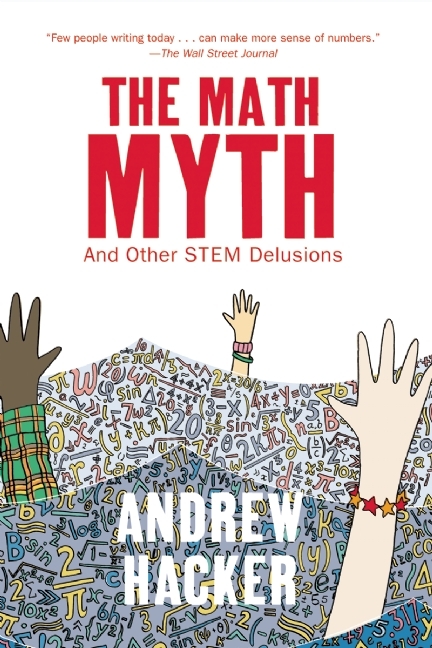🤡 He Talks in Maths, He Buzzes Like a Fridge...
The Crime: The Math Myth: And Other STEM Delusions
The Guilty Party: Andrew Hacker
Overview: An Oxford Emeritus Professor expounds on the idea that American schools are over-emphasizing mathematics and argues his point with some of the most questionable logic I've ever read in a real book.
Why I Hate It...
I have a degree in mathematics, I work with technology, and I use math routinely in my job, so when I picked up Andrew Hacker’s anti-STEM manifesto, I expected to hate it. So I was actually surprised to find the overview section compelling. Hacker’s thesis is that STEM is over-emphasized in American education and that this does more net harm than good to students. I disagree, but I like to be challenged, and I was on board with this book for the first ten pages or so. I was eager to see his arguments.Unfortunately for his cause, Hacker puts on an exhibition in fallacious logic, questionable reasoning, and outright dishonesty. His central thesis seems to be that math is just too darn hard, despite the fact that children in other countries don’t have the same problem with it as Americans. He never touches on possible reasons for this, be they cultural, genetic, or otherwise. Most of his “arguments” are laid out in speech bubbles as unsourced quotations. His analogies are often hilariously flawed. He asserts that being a strong swimmer wouldn’t help you as a lacrosse player—seemingly ignorant of the physical conditioning that underpins both. During a lengthy screed against Common Core (which is not uncontroversial, admittedly) he tries to delegitimize the Association of Governors advocating for it by complaining that only twenty-nine out of fifty governors showed up to the meeting. Most of them, in other words.
In fact, there’s anti-elitism throughout this book. He rails against highly selective institutions like Harvard for using stringent math requirements as part of their selection process. He builds this towards a chapter wherein—and I’m not making any of this up—he posits a cabal of elite mathematics scholars working to keep math in curricula but making sure it’s so hard that no one but themselves can excel in it, leaving them free to do research while grad students and TA’s handle the teaching work. He calls these scholars “mandarins”, because hey, if you’re going to be insulting, why not be a little racist too, I guess.
His solutions are just as bizarre. He advocates small group discussions over math problems. In his most egregious chapter, he suggests making the SAT a take-home exam to get around possible problems of sexism. And this chapter is where he does his most flagrantly dishonest work. In order to prove that the SAT is sexist, he takes PSAT scores for the state of Ohio and breaks them out by gender—only he doesn’t have the gender data, so he goes by first name. He excludes “ethnic” names and guesses on gender-neutral names using the ratios he already had as a guideline. And he admits that fully a fourth of the data fits these category. So when he ends up showing that boys have a 54-46 edge over girls, it’s hard to take that 8% difference seriously, because of the amount of guess-work that went into an already small sample.
But this isn't dishonest, just sketchy. For dishonesty, I would direct you to the chart of unemployment rates in specified counties (note: it's county, not country) expressed as a ratio of the unemployment rate in that county to that of the entire nation. This makes a county with a 9%-or-so unemployment rate show up on the chart at a head-slappy 134%. Elsewhere, Hacker identifies math as the leading academic reason for the 20% high school drop-out rate. While he, in one instance, admits that there are other more significant non-academic reasons, he never offers any real numbers about what those are. He just lets the reader see 20% drop-out rate attributed to math and leaves it there.
The fact that his stats are so atrocious is what makes this book contemptible instead of purely bad. To use misleading math to argue that math education is unnecessary? It’s almost like some bizarro reductio ad absurdum argument for comprehensive math education, because not only does he lie, but he lies very transparently. The secret message of this book could be: learn statistics so you won’t be fooled by books like this. In fact, I’ve changed my mind. Everyone should read this book purely as an inoculation against this kind of ignorance.
Next week we return to the silver screen with the film that should have ended M. Night Shyamalan's career: M. Night Shyamalan's The Last Airbender by M. Night Shyamalan.
In CONSUMED WITH HATE, Kurt is revisiting media that he absolutely did not like one bit. See more posts.

Comments